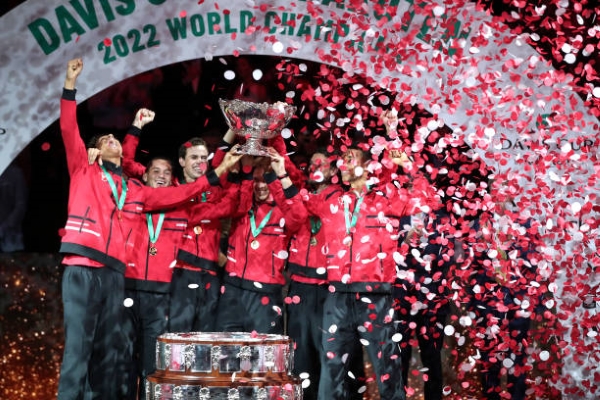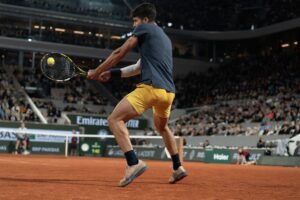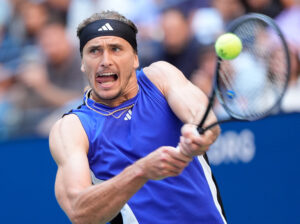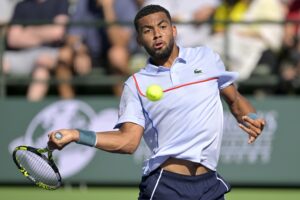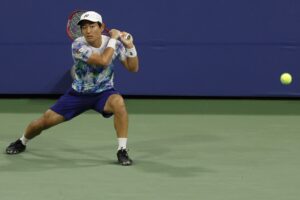Nearly a whole year after winning the ATP Cup in Australia right at the start of the season, Canada’s men ended the season with a unique team tennis double by winning the Davis Cup for the first time ever. In so doing, Felix Auger-Aliassime, Denis Shapovalov and their doubles specialist Vasek Pospisil, who won key matches whether he was playing with Auger-Aliassime or Shapovalov, proved that Canada’s men truly are the kings of team tennis.
Canada’s Davis Cup Win Has Been A Long Time Coming
Canada’s first ever Davis Cup win has been a long time coming. Three years ago, in that long-ago, almost mythical pre-pandemic world, they had been runners-up at the first staging of what can be called “Davis Cup 2.0”. That is the reboot of the century-old international team tournament whereby teams play off in a finals event at the end of the year rather than playing each other throughout the year. In 2019, Canada had done brilliantly to reach the final. However, almost inevitably they lost to Spain, the 21st century’s serial Davis Cup winners, especially as Spain were playing on home soil (or at least home hardcourt).
That defeat, painful as it was, provided the groundwork for the 2022 Davis Cup triumph, because it proved that Canada’s two young stars, Auger-Aliassime and Shapovalov, could work well together in a senior team environment, having played together as juniors in numerous team events. However, the real breakthrough came earlier this year when they turned the tables on Spain (albeit one without Rafael Nadal, who had been instrumental in the 2019 Davis Cup triumph) by winning the ATP Cup for the first time.
Auger-Aliassime’s Laver Cup Triumph Was Instrumental
Arguably, the most important team triumph for Canada this year came not when Auger-Aliassime was representing his home country but when he was representing The Rest of the World against Europe in the Laver Cup at the O2 in September. The result of that event has almost been forgotten in all the hoopla surrounding Roger Federer’s retirement. However, The Rest of the World won the tournament for the first time and Auger-Aliassime’s defeat of Novak Djokovic was the turning-point.
It has proved to be a turning-point not only for the Rest of the World team but for Auger-Aliassime himself. He has carried forward all the momentum gained by beating Djokovic into the final months of the season, when he has been arguably the best male tennis player in the world, especially indoors. First, he defeated new world #1 Carlos Alcaraz, immediately after his US Open triumph, by beating him in the Davis Cup qualifying stages in September. Then he went on an astonishing run at the European indoor events, winning three tournaments in succession in Florence, Antwerp and Basel, where he again defeated Alcaraz, albeit an Alcaraz who would later end his season early because of injury.
Finally, Auger-Aliassime took all his new-found form and confidence into the Davis Cup Finals week. He was imperious in all three of his matches, beating Germany’s Oscar Otte, Italy’s Lorenzo Musetti and Australia’s Alex de Minaur in the quarterfinal, semifinal and final respectively without dropping a single set. The win against de Minaur was particularly impressive, given that the Australian has himself been a magnificent Davis Cup player, but as with Otte and Musetti before him, de Minaur was dispatched in straight sets.
For good measure in the semifinal against Italy, Auger-Aliassime played in the deciding doubles match, after Shapovalov had lost his singles match against Lorenzo Sonego and been replaced for the doubles by Canada’s Davis Cup Captain, Frank Dancevic. And just as he had done all week in the singles, Auger-Aliassime played beautifully with Pospisil to beat Italy’s experienced and powerful pairing, Fabio Fognini and Matteo Berrettini, in straight sets.
But Even F2A Couldn’t Do It Alone
The nature of team tennis is that no one player, however great they are, can ever win a tournament on their own; the continuing inclusion of doubles, despite its marginalisation in the rest of tennis, ensures that that is not possible. So, for all the brilliance of Auger-Aliassime in Malaga, he still needed his team-mates to help him secure the Davis Cup.
First there should be special mention for Shapovalov, who has been left somewhat trailing by Auger-Aliassime’s recent rise up the rankings. He showed tremendous fortitude to respond to his dropping for the doubles match in the semifinal by winning his singles match in the final, against Thanasi Kokkinakis, in straight sets.
However, even more special mention should be given to Canada’s doubles specialist, Pospisil (a Major champion in the format). If it had not been for a succession of horrendous injuries, Pospisil might well have excelled in singles, not least because he is one of the finest and most natural volleyers of his generation. Of course volleying is still absolutely at the heart of doubles and always will be, so Pospisil has transitioned relatively easily into becoming a doubles specialist.
His ability to play well whoever he was partnered with in the Davis Cup – Auger-Aliassime or Shapovalov – was the main reason why Canada won both the doubles matches it had to play, in the quarterfinal and semifinal. The quarterfinal triumph, achieved with Shapovalov, was particularly noteworthy, as it came against Germany’s superb doubles pairing of Kevin Krawietz and Tim Puetz, who had never before lost a Davis Cup doubles tie.
Is A Major Next For Canada?
After dominating men’s team tennis throughout the whole of 2022, the next step for Canada’s winning team (Pospisil excepted) is to translate that team form into sustained individual success at the Majors. Incredibly, Canada has never had a male Major winner. Both Shapovalov and Auger-Aliassime reached Major semifinals in 2021 (at Wimbledon and the US Open respectively), but neither of them were able to replicate that success in 2022.
Now the hope is that, emboldened by their double team tennis triumph, both Shapovalov and Auger-Aliassime can get back to their 2021 best and even improve upon it. Auger-Aliassime in particular has shown that he is capable of matching Carolos Alcaraz and Holger Rune as the best young male players on the tour. Now he just might be capable of replicating Novak Djokovic, whose 2010 Davis Cup triumph with Serbia proved the platform for his subsequent domination of men’s tennis for the next decade. Auger-Aliassime may not achieve that kind of spectacular Davis Cup “bounce”, but everything he has done in 2022 and especially over the last week suggests that he now has everything required to be a Major winner.
Main photo:
Embed from Getty Images


